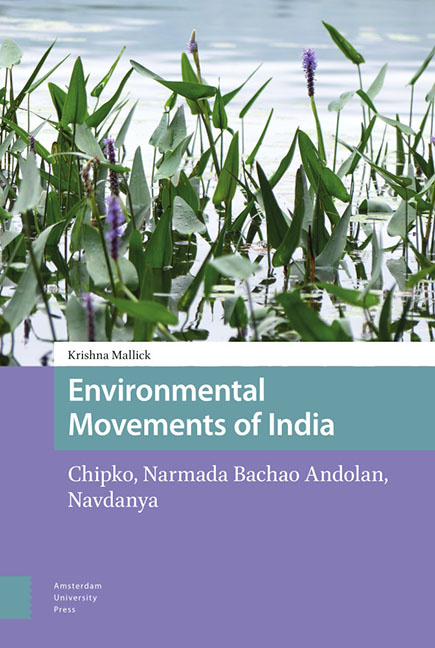Book contents
- Frontmatter
- Dedication
- Contents
- Acknowledgments
- Foreword
- Glossary
- Introduction: Three Grassroots Movements That Made a Global Impact
- 1 Historical and Cultural Contexts in India
- 2 Chipko (Hug the Trees) Movement
- 3 Narmada Bachao Andolan (NBA): Save the Narmada
- 4 Navdanya (Nine Seeds) Movement
- 5 Moral Implications of Environmental Movements
- 6 Hindu Ethics and Ecology
- Conclusion: The Symbiosis of Natural Resources and Local Needs
- Index
4 - Navdanya (Nine Seeds) Movement
Published online by Cambridge University Press: 13 November 2021
- Frontmatter
- Dedication
- Contents
- Acknowledgments
- Foreword
- Glossary
- Introduction: Three Grassroots Movements That Made a Global Impact
- 1 Historical and Cultural Contexts in India
- 2 Chipko (Hug the Trees) Movement
- 3 Narmada Bachao Andolan (NBA): Save the Narmada
- 4 Navdanya (Nine Seeds) Movement
- 5 Moral Implications of Environmental Movements
- 6 Hindu Ethics and Ecology
- Conclusion: The Symbiosis of Natural Resources and Local Needs
- Index
Summary
Abstract
This chapter addresses the issue of sustainable agriculture by relating it to food sovereignty and food security and the contribution that Navdanya is making by promoting seed satyagraha, or civil disobedience against seed control by large corporations. The founder of Navdanya, Vandana Shiva, is highly critical of GM crops and chemically based industrial agriculture, which are monopolized by multinational companies in India. Shiva's philosophy of Earth Democracy is based on the premise of the interconnectedness of everything. Agroecology must be transformed based on sustainable agriculture, which is possible only by promoting local farmers who use organic seeds from community seed banks such as those started by Navdanya and can protect their livelihood and communities as well as the natural resources.
Keywords: GMOs (genetically modified organisms), Earth Democracy, Vandana Shiva, food sovereignty, sustainable agriculture, La Via Campesina
In the 1960s and 1970s, the Green Revolution in India provided food security for a nation whose population had more than doubled since independence in 1947. Agricultural productivity was achieved through heavy reliance on fertilizers and pesticides as well a few high-yield seed varieties, sown in the agricultural practice of monocropping – growing a single crop repeatedly on the same land to increase efficiency – which in turn reduces agricultural diversity. Decades of monocropping have led to soil salinization and degradation, along with major increases in water consumption through public subsidies and abusive practices (Vyas, 2003) as well as accelerated groundwater depletion even in such rain-fed states as Andhra Pradesh, Karnataka, Rajasthan, Madhya Pradesh, Chhattisgarh, and Gujarat (Virmani & Lepineux, 2015).
The Navdanya movement is a struggle for freedom against large transnational corporations and their partnered states for the most fundamental survival needs: food and water. In this movement, independent and indigenous farmers practiced civil disobedience by refusing to follow laws constructed and enforced by the very states charged with protecting their fundamental human rights (Armaline & Glasberg, 2009). Agricultural biotechnology is at the forefront of the international development discourse. The debate around genetically modified (GM) crops has widened to include the future of agriculture and small-scale farmers, corporate control, property rights, and the rules of global trade (Scoones, 2008).
- Type
- Chapter
- Information
- Environmental Movements of IndiaChipko, Narmada Bachao Andolan, Navdanya, pp. 83 - 114Publisher: Amsterdam University PressPrint publication year: 2021



